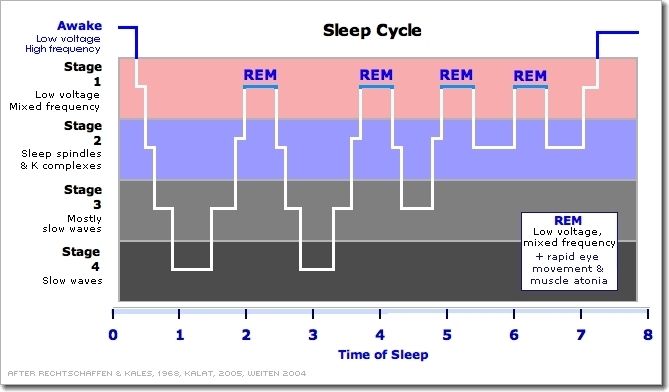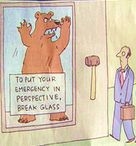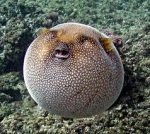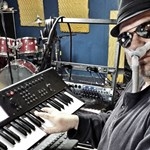Is dreaming a reliable gauge of sleep quality?
Is dreaming a reliable gauge of sleep quality?
After not dreaming (to my knowledge) for many, many years I started dreaming a lot when I began PAP therapy some seven months ago. I've read that this is reported by many. Lately I have vivid dreams many nights, but not always.
I believe I'm correct in saying that most dreaming comes only in REM stage sleep. Would that then mean that vivid dreaming would be a good indication that one had deep, restful sleep? And would the inverse be true, that is if one did not dream that he likely din't have restful sleep that night? And I guess I should ask if it's possible to dream but be unaware of it in the morning?
Given that home EEG monitors don't exist, is the gold standard for determining sleep quality just how you feel the next day?
I believe I'm correct in saying that most dreaming comes only in REM stage sleep. Would that then mean that vivid dreaming would be a good indication that one had deep, restful sleep? And would the inverse be true, that is if one did not dream that he likely din't have restful sleep that night? And I guess I should ask if it's possible to dream but be unaware of it in the morning?
Given that home EEG monitors don't exist, is the gold standard for determining sleep quality just how you feel the next day?
_________________
| Machine: ResMed AirSense™ 10 AutoSet™ CPAP Machine with HumidAir™ Heated Humidifier |
| Mask: DreamWear Full Face CPAP Mask with Headgear (Small and Medium Frame Included) |
| Additional Comments: Pressure 11.0 Min-->14.0 Max EPR 2 |
-
HoseCrusher
- Posts: 2744
- Joined: Tue Oct 12, 2010 6:42 pm
Re: Is dreaming a reliable gauge of sleep quality?
Lacking an EEG, a good measure of sleep quality is how you feel the next morning. Unfortunately, there are many variables to consider...
I don't think anyone understands why we dream or what dreaming means. If you are beginning to dream I think you should just enjoy them.
I don't think anyone understands why we dream or what dreaming means. If you are beginning to dream I think you should just enjoy them.
_________________
| Mask: Brevida™ Nasal Pillow CPAP Mask with Headgear |
| Additional Comments: Machine is an AirSense 10 AutoSet For Her with Heated Humidifier. |
SpO2 96+% and holding...
- BlackSpinner
- Posts: 9742
- Joined: Sat Apr 25, 2009 5:44 pm
- Location: Edmonton Alberta
- Contact:
Re: Is dreaming a reliable gauge of sleep quality?
No, you dream in many different sleep phases, the dreams are different and have different functions in each phase. Go and Google "PBS Nova Dreams". They have a really good video on sleep and dreams.old dude wrote:
I believe I'm correct in saying that most dreaming comes only in REM stage sleep?
Waking up in a dream can be good or bad depending on why you are waking up. REM dreams are deeper and sometimes tend to cause more events so if you are waking in REM dreams it can mean your pressure is not optimal. REM dreams are more "Challenging" emotionally while other dreams tend to be happy fun time dreams.
_________________
| Machine: PR System One REMStar 60 Series Auto CPAP Machine |
| Additional Comments: Quatro mask for colds & flus S8 elite for back up |
71. The lame can ride on horseback, the one-handed drive cattle. The deaf, fight and be useful. To be blind is better than to be burnt on the pyre. No one gets good from a corpse. The Havamal
Re: Is dreaming a reliable gauge of sleep quality?
I have just started (about 2 weeks) on CPAP and I am dreaming more and vivid then I have in a long time. I would imagine not having my sleep interrupted permits this, but I don't know for sure. But yes more dreaming then I remember in a long while.
- Sir NoddinOff
- Posts: 4190
- Joined: Mon May 14, 2012 5:30 pm
- Location: California
Re: Is dreaming a reliable gauge of sleep quality?
The method I'll describe below will give you a window into what's happening during the entire night. Typically the first REM period starts 60 to 90 minutes after sleep onset. You will usually see flow spikes and various apneas before, during and maybe after the REM periods. Most people with normal sleep, after several hours, come back up to stage one or two and then go back to REM for another go round with the same apnea and flow spikes, but generally not as pronounced as the first set. The same continues for the rest of the night. Age can be a big factor in one's sleep patterns. This method below works nicely with Sleephead cuz it does time calcs for you automatically, but with some experience it'll work with any other sleep software:
To tell when I'm actually sleeping I look at my Respiration Rate, plus my Tidal Volume line, plus my Minute Ventilation line, then correlate them to my software's timeline (the hourly horizontal axis at the bottom). Unfortunately, I can't tell you what your ideal lines/graphs are in these three categories because everybody is different, however I can say that when you absolutely know you were asleep inspect those three aforementioned flow lines (RR, TV and MV), memorize the patterns, then overlay that data with your precise known sleep times. I realize this sounds hard to do but it's not really that tough. Over several nights, a strong pattern will emerge if you are careful in your observations. You will also be able to spot transitions from wakefulness to real sleep and vice versa, which is actually the easiest part. This critical inspection process is the key to understanding your body/brain entry into the four recognized sleep stages, and as a bonus it lets you drop from your calculations all the minutes/hours you were awake (Tip: these sleep transition periods all look a lot rougher, choppy even). It's very cool to see it all play out at night, as long as you feel good enough in the morning to enjoy it. Summary: Keep records of the things I mentioned above for a week or so... you will begin to see distinct waveform patterns emerge contrasting wakefulness vs sleep.

To tell when I'm actually sleeping I look at my Respiration Rate, plus my Tidal Volume line, plus my Minute Ventilation line, then correlate them to my software's timeline (the hourly horizontal axis at the bottom). Unfortunately, I can't tell you what your ideal lines/graphs are in these three categories because everybody is different, however I can say that when you absolutely know you were asleep inspect those three aforementioned flow lines (RR, TV and MV), memorize the patterns, then overlay that data with your precise known sleep times. I realize this sounds hard to do but it's not really that tough. Over several nights, a strong pattern will emerge if you are careful in your observations. You will also be able to spot transitions from wakefulness to real sleep and vice versa, which is actually the easiest part. This critical inspection process is the key to understanding your body/brain entry into the four recognized sleep stages, and as a bonus it lets you drop from your calculations all the minutes/hours you were awake (Tip: these sleep transition periods all look a lot rougher, choppy even). It's very cool to see it all play out at night, as long as you feel good enough in the morning to enjoy it. Summary: Keep records of the things I mentioned above for a week or so... you will begin to see distinct waveform patterns emerge contrasting wakefulness vs sleep.

_________________
| Mask: AirFit™ F10 Full Face Mask with Headgear |
| Additional Comments: Sleepyhead software v.0.9.8.1 Open GL and Encore Pro v2.2. |
Last edited by Sir NoddinOff on Thu Dec 12, 2013 10:44 am, edited 1 time in total.
I like my ResMed AirFit F10 FFM - reasonably low leaks for my ASV therapy. I'm currently using a PR S1 AutoSV 960P Advanced. I also keep a ResMed S9 Adapt as backup. I use a heated Hibernite hose. Still rockin' with Win 7 by using GWX to stop Win 10.
Re: Is dreaming a reliable gauge of sleep quality?
Hi,old dude wrote:Given that home EEG monitors don't exist, is the gold standard for determining sleep quality just how you feel the next day?
If you are having vivid dreams after starting on CPAP, that is a really good sign. That means that you are suddenly getting a lot more quality sleep and probably getting a lot more REM than you did before. The reason that this is so vivid is that the dreaming (at least at this level) is new to you. Over time, the newness is going to wear off. You will get used to it, and they will slowly get less vivid, then seem to go away. They don't really go away, you just stop remembering them because it is routine again.
-john-
Re: Is dreaming a reliable gauge of sleep quality?
Thanks much, this makes a lot of sense to me!jweeks wrote:Hi,old dude wrote:Given that home EEG monitors don't exist, is the gold standard for determining sleep quality just how you feel the next day?
If you are having vivid dreams after starting on CPAP, that is a really good sign. That means that you are suddenly getting a lot more quality sleep and probably getting a lot more REM than you did before. The reason that this is so vivid is that the dreaming (at least at this level) is new to you. Over time, the newness is going to wear off. You will get used to it, and they will slowly get less vivid, then seem to go away. They don't really go away, you just stop remembering them because it is routine again.
-john-
_________________
| Machine: ResMed AirSense™ 10 AutoSet™ CPAP Machine with HumidAir™ Heated Humidifier |
| Mask: DreamWear Full Face CPAP Mask with Headgear (Small and Medium Frame Included) |
| Additional Comments: Pressure 11.0 Min-->14.0 Max EPR 2 |
- chunkyfrog
- Posts: 34545
- Joined: Mon Jul 12, 2010 5:10 pm
- Location: Nowhere special--this year in particular.
Re: Is dreaming a reliable gauge of sleep quality?
When I wear my Zeo, I observe a nice balance between the levels of sleep that I experience.
Speaking of home EEG's, has anyone heard anything about the Melon EEG?
They far surpassed their Kickstarter campaign (by 100X)--on technology that had been introduced in 2005 or earlier under a different name.
Supporters who were promised product were to have received their headbands last month (November 2013)
No information since August--was it a "fly-by-night"? When if ever, will we see this in stores or for sale online?
Speaking of home EEG's, has anyone heard anything about the Melon EEG?
They far surpassed their Kickstarter campaign (by 100X)--on technology that had been introduced in 2005 or earlier under a different name.
Supporters who were promised product were to have received their headbands last month (November 2013)
No information since August--was it a "fly-by-night"? When if ever, will we see this in stores or for sale online?
_________________
| Mask: AirFit™ P10 For Her Nasal Pillow CPAP Mask with Headgear |
| Additional Comments: Airsense 10 Autoset for Her |
- SleepingUgly
- Posts: 4690
- Joined: Sat Nov 28, 2009 9:32 pm
Re: Is dreaming a reliable gauge of sleep quality?
I think it's individual. For me, the more vivid my dreams, and the more I remember them, the worse my sleep is. Untreated, I feel like I've been up all night watching movies.
_________________
| Mask: Swift™ FX For Her Nasal Pillow CPAP Mask with Headgear |
| Humidifier: S9™ Series H5i™ Heated Humidifier with Climate Control |
| Additional Comments: Rescan 3.10 |
Never put your fate entirely in the hands of someone who cares less about it than you do. --Sleeping Ugly
Re: Is dreaming a reliable gauge of sleep quality?
There are many persons who never dream. I forgot the name of this disease that the Neurologist's PA told me about. There are no REMS and no EEG dreaming waves. Of course, it's not normal. Another story is that you can have REMs and dream (Dave {"Not Muffy"}, the nasty Sleep Tech, can see your eyes movements while you are in the sleep clinic and dream) but you don't remember them, unless you wake up while dreaming. So you might decide that you don't have dreams.
IMO, Old Dude, will not get an exact reply to his question.
Because the above Dream Gram is theoretical normal and most of us here are practically OFF Normal.
IMO, Old Dude, will not get an exact reply to his question.
Because the above Dream Gram is theoretical normal and most of us here are practically OFF Normal.
_________________
| Humidifier: S9™ Series H5i™ Heated Humidifier with Climate Control |
| Additional Comments: S9 Autoset machine; Ruby chinstrap under the mask straps; ResScan 5.6 |
- JohnBFisher
- Posts: 3821
- Joined: Wed Oct 14, 2009 6:33 am
Re: Is dreaming a reliable gauge of sleep quality?
Excluding AVI's example, everyone dreams (except for those strange few). Some people never remember dreaming. Some people remember lots of details. Personally, I am in between and only remember that I was dreaming .. vividly.
But knowing you are dreaming and that you were not prior to the start of CPAP .. That's a good sign and probably means that your sleep is back toward normal. It would indicate that you are spending more time in REM sleep.
But knowing you are dreaming and that you were not prior to the start of CPAP .. That's a good sign and probably means that your sleep is back toward normal. It would indicate that you are spending more time in REM sleep.
_________________
| Mask: Quattro™ FX Full Face CPAP Mask with Headgear |
| Additional Comments: User of xPAP therapy for over 20 yrs. Resmed & Respironics ASV units with EEP=9cm-14cm H2O; PSmin=4cm H2O; PSmax=15cm H2O; Max=25cm H2O |
"I get up. I walk. I fall down. Meanwhile, I keep dancing” from Rabbi Hillel
"I wish to paint in such a manner as if I were photographing dreams." from Zdzisław Beksiński
"I wish to paint in such a manner as if I were photographing dreams." from Zdzisław Beksiński
Re: Is dreaming a reliable gauge of sleep quality?
We have no idea how much we dream, since we only remember dreams that occur near certain kinds of arousals or awakenings. So even if dreaming were a reliable gauge, we still have no reliable way of knowing how much we dreamed--we can only know how many dreams we remember, or dream recall, which is a different issue entirely.old dude wrote:Is dreaming a reliable gauge of sleep quality?
When people start out on PAP, they may be getting consolidated REM sleep for the first time in their lives and may have a lot of REM to catch up on. This can occur around the same time that they are also getting used to sleeping with CPAP and are thus having different forms of arousals and awakenings from wearing the mask for the first time. Those two factors combined may make SOME new PAP-therapy patients more likely to remember their emotionally vivid dreams, regardless of whether they are having more, or less, of them.
My understanding is that sleep docs, in general, do NOT traditionally consider dream recall a good sign or a bad sign, since the remembering of dreams is a highly individual thing. The docs are not there to treat dreams or the remembering of dreams; they are there to help people improve sleep. So reports of remembered dreams are not so much considered a good or bad sign on their own beyond the fact that a possibly-significant difference is being reported. The problem, though, is that reports from patients on aspects of their own sleep are notoriously inaccurate--thus the need for sleep studies to find out what is actually going on with a patient's sleep.
So if someone starting out with PAP suddenly starts remembering dreams, I think he can consider that a good sign in that PAP is having an effect on his sleep. However, if someone starting out does NOT suddenly start remembering dreams, I think that patient, as well, can consider that a good sign, since he is not being aroused and awakened in a way that causes him to remember. So there is no need to panic either way. Notice the change. File it away. See what it means in time.
Just my opinion as an opinionated fellow PAPper.
And related matters continue to be studied. For example:
http://www.omicsgroup.org/journals/2167 ... -2-127.pdf
That study reports that studies appear to have contradictory findings:
So when it comes to the studies trying to figure out the averages and the "usual" as far as dream recall and CPAP, my opinion is that it may depend on the severity of patients being questioned, the timing of when the questions are asked, and the way the questions are asked.CPAP dream dudes reporting on other CPAP dream dudes' studies wrote:"Studies report . . . a higher amount of dream recall under CPAP therapy than without treatment. The study published by Carrasco in 2006 concludes dream recall is decreasing with CPAP, which is in contradiction to the other results in the literature."
-
SuddenlyWornOut45
- Posts: 193
- Joined: Sun Dec 08, 2013 7:41 pm
Re: Is dreaming a reliable gauge of sleep quality?
I would say, yes. When I dream, as long as they are not nightmares or something, I usually experience "deeper feeling" sleep and wake up feeling more restored and more well rested. By contrast when I never dream (which is most of the time), my sleep quality is not so great. I will admit in my case I rarely dream because I am on big doses of klonopin, which suppresses deep stage sleep.
But if you are not on certain kinds of medications that suppress deep stage sleep and not taking OTC anti-histamines or drinking booze, CPAP therapy SHOULD be giving you more dreams and SHOULD be giving you subjectively deeper feeling sleep that is restorative sleep. If it is not, someone is wrong. Either your CPAP therapy needs tweaking somehow or you need a new sleep study or you need to find a way to get off medications that are dumbing down your deep stages of sleep and preventing the CPAP from doing its full work.
Eric
But if you are not on certain kinds of medications that suppress deep stage sleep and not taking OTC anti-histamines or drinking booze, CPAP therapy SHOULD be giving you more dreams and SHOULD be giving you subjectively deeper feeling sleep that is restorative sleep. If it is not, someone is wrong. Either your CPAP therapy needs tweaking somehow or you need a new sleep study or you need to find a way to get off medications that are dumbing down your deep stages of sleep and preventing the CPAP from doing its full work.
Eric
- Denial Dave
- Posts: 1335
- Joined: Wed Sep 19, 2012 6:45 am
- Location: Connecticut
Re: Is dreaming a reliable gauge of sleep quality?
Pre-CPAP, I used to dream all the time.... but I can't recall having any dreams since I started CPAP over a year ago
In theory, my sleep quality should be much better with CPAP
Dave
In theory, my sleep quality should be much better with CPAP
Dave
_________________
| Mask: Mirage Quattro™ Full Face CPAP Mask with Headgear |
| Humidifier: S9™ Series H5i™ Heated Humidifier with Climate Control |
| Additional Comments: Started at VPAP pressure setting of 20/14.4. I've survived Stage 1 cancer and lost 80+ lbs. Pressure is now 14.5 / 11 |
if you don't know where you are going... any road will take you there.... George Harrison
Re: Is dreaming a reliable gauge of sleep quality?
Hi, everyone. First post here: I have always had dreams while being severely sleep deprived, with one hallmark: sometimes I would confuse dreams with reality. For instance, if I had a dream about going to the park and playing ball with my son, I would have to ask if we actually did that. It kinda scared me that I was losing this distinction and it was one of the catalysts for me to seek out my diagnosis.
Before finally getting off my butt and getting officially diagnosed last month, I recall a couple times in the last two - three years where I had a very vivid and remarkable dream. There was usually a white light (I'm not kidding) that people were walking into (or in one case, carried into), but I instinctively knew that it was wrong for me to follow them. In the dream, I tried to run away from the light and I would *always* wake up gasping for breath with my heart painfully pounding out of my chest and my brain swirling around in disorientation. At the time, I thought it was just the by-product of a bad dream/nightmare, but in retrospect, I am wondering if this was a near-death experience. I'm wondering if I might've been close once or twice. Has anyone experienced this before? Do you think it's possible that I was dying?
I've had my S9 Autoset for 3 days now (w/Swift FX nasal pillows) and despite some minor comfort adjustments with the headgear and air pressure, I am really happy! I'm a tinkerer, so I can't wait to download the ResScan software and see what's going on "under the hood".
Before finally getting off my butt and getting officially diagnosed last month, I recall a couple times in the last two - three years where I had a very vivid and remarkable dream. There was usually a white light (I'm not kidding) that people were walking into (or in one case, carried into), but I instinctively knew that it was wrong for me to follow them. In the dream, I tried to run away from the light and I would *always* wake up gasping for breath with my heart painfully pounding out of my chest and my brain swirling around in disorientation. At the time, I thought it was just the by-product of a bad dream/nightmare, but in retrospect, I am wondering if this was a near-death experience. I'm wondering if I might've been close once or twice. Has anyone experienced this before? Do you think it's possible that I was dying?
I've had my S9 Autoset for 3 days now (w/Swift FX nasal pillows) and despite some minor comfort adjustments with the headgear and air pressure, I am really happy! I'm a tinkerer, so I can't wait to download the ResScan software and see what's going on "under the hood".
_________________
| Mask: Swift™ FX Nasal Pillow CPAP Mask with Headgear |
| Humidifier: S9™ Series H5i™ Heated Humidifier with Climate Control |
| Additional Comments: CPAP 12.0 cmH20 |

















